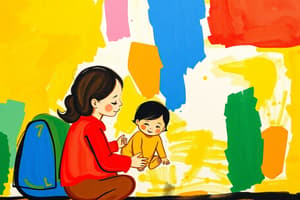Podcast
Questions and Answers
What role is NOT mentioned in the contemporary perspectives of children?
What role is NOT mentioned in the contemporary perspectives of children?
- Inventors (correct)
- Natural Researchers
- Activists
- Lobbyists
Which philosophical foundation emphasizes the importance of how environments influence children?
Which philosophical foundation emphasizes the importance of how environments influence children?
- Power of time
- Environments that speak (correct)
- Pedagogy of listening
- Language of relationships
According to the contemporary images of children, they are seen as capable in which aspect?
According to the contemporary images of children, they are seen as capable in which aspect?
- Limited in their creative expression
- Passive recipients of information
- Active contributors to their learning (correct)
- Dependent on adult guidance
Which quote advocates for observing children to enhance teaching approaches?
Which quote advocates for observing children to enhance teaching approaches?
Which of the following roles emphasizes children's involvement in community and societal issues?
Which of the following roles emphasizes children's involvement in community and societal issues?
What concept does the term 'co-constructors' signify in relation to children?
What concept does the term 'co-constructors' signify in relation to children?
What is implied by the phrase 'power of time' in the philosophical foundations?
What is implied by the phrase 'power of time' in the philosophical foundations?
Which of the following roles highlights children’s creative expression and originality?
Which of the following roles highlights children’s creative expression and originality?
Flashcards are hidden until you start studying
Study Notes
Historical Foundations
- Image of the child is a central concept reflecting a shift in pedagogical approaches.
- Pedagogy of listening emphasizes attentively understanding children’s perspectives.
- Language of relationships fosters communication and connections among children and educators.
- Environments that speak focus on creating spaces that stimulate exploration and learning.
- Power of time allows for deeper engagement and understanding in children’s learning processes.
- Documentation serves as a tool for reflecting on and sharing children’s experiences and development.
Contemporary Perspectives of Children
- Children regarded as architects, actively shaping their learning experiences and environments.
- Considered artists, capable of expressing ideas and emotions through various media.
- Seen as collaborators, working together with peers and adults in the learning process.
- Co-constructors of knowledge, engaging in shared inquiry and problem-solving.
- Natural researchers, innately curious about the world around them and eager to explore.
- Civic participants involved in their communities and understanding their roles within them.
- Activists advocating for causes important to them, demonstrating social awareness.
- Conservationists focused on sustainability and caring for the environment.
- Lobbyists expressing their opinions and influencing decisions affecting their lives.
Learning Philosophy
- Emphasizes leaving space for children's learning to unfold naturally.
- Observation is essential, requiring educators to listen closely to children's actions and thoughts.
- Understanding children's perspectives can fundamentally change teaching practices.
Studying That Suits You
Use AI to generate personalized quizzes and flashcards to suit your learning preferences.




